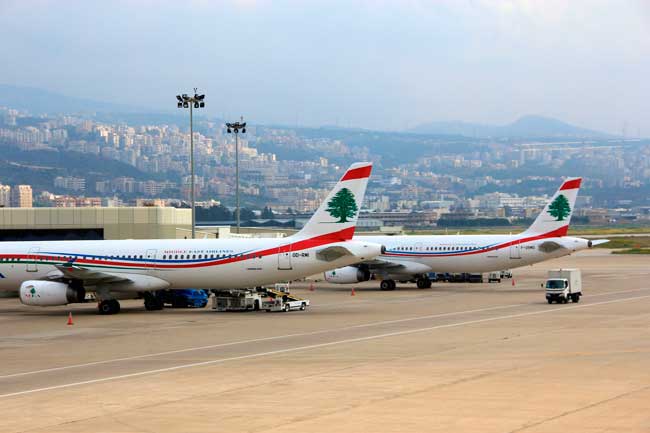Lebanon airport hacked sent shockwaves through the aviation industry, highlighting the vulnerabilities that exist in air travel security. As an airport that prides itself on providing a safe and secure travel experience for passengers, Lebanon airport was determined to overcome this setback and rebuild its security infrastructure. This article will delve into the impact of the cyber attack on air travel security, the measures taken by lebanon airport hacked , and the steps that need to be taken to prevent future cyber attacks.

The impact of the cyber attack on air travel security
The cyber attack on Lebanon airport hacked had far-reaching implications for air travel security. It exposed weaknesses in the airport’s systems, allowing hackers to gain unauthorized access to information and disrupt operations. This not only compromised the safety of passengers but also damaged the reputation of Lebanon airport as a secure travel hub.
The consequences of the attack were significant. Flights were delayed or canceled, causing inconvenience to passengers and financial losses to airlines. The breach of sensitive passenger data raised concerns about identity theft and privacy violations. Moreover, the attack eroded trust in the airport’s ability to protect travelers, leading to a decrease in passenger numbers.
lebanon airport hacked swiftly took action to rectify the situation and bolster its air travel security. The airport management collaborated with cybersecurity experts to conduct a thorough assessment of their systems and identify vulnerabilities. They implemented advanced intrusion detection systems and strengthened firewalls to prevent future attacks.
learn more about : what is Cyber Security | Definition and Types
The role of government agencies in ensuring air travel security
In the case of lebanon airport hacked, the government swiftly intervened to support the airport in its recovery efforts and enhance overall security measures. Government agencies can contribute to air travel security by:
Enacting legislation: passing laws and regulations that mandate strict cybersecurity standards for airports. Compliance with these standards ensures a baseline level of security across the industry.
Providing financial support: allocating funds to airports to invest in cybersecurity infrastructure and training programs. This financial support enables airports to implement robust security measures without compromising their financial viability.
Establishing coordination mechanisms: facilitating collaboration and information sharing between airports, international aviation authorities, and cybersecurity experts. This exchange of knowledge and expertise strengthens the overall security posture of airports.
Rebuilding passenger trust after the cyber attack
The cyber attack on lebanon airport hacked had a significant impact on passenger trust. Rebuilding this trust is crucial to restore the airport’s reputation and ensure a thriving air travel industry. Lebanon airport hacked recognized the importance of transparent communication and proactive measures to regain passenger confidence.
The airport management implemented several initiatives to rebuild passenger trust, including:
Open communication channels: Lebanon airport established dedicated communication channels to address passenger concerns and provide regular updates on the progress of their security enhancement efforts. This transparent approach helped alleviate anxieties and fostered trust among passengers.
Educational campaigns: The airport launched comprehensive educational campaigns to raise awareness among passengers about the importance of cybersecurity and their role in maintaining a secure air travel environment. By empowering passengers with knowledge, Lebanon airport aimed to create a collective sense of responsibility towards air travel security.
Investing in passenger-centric security measures: Lebanon airport invested in passenger-centric security measures, such as streamlined security checkpoints and advanced screening technologies. By prioritizing passenger convenience without compromising security, the airport aimed to enhance the overall travel experience and rebuild trust.
Through these concerted efforts, lebanon airport endeavors to rebuild passenger trust and position itself as a leader in air travel security.
Steps for preventing future cyber attacks like Lebanon airport hacked
Lebanon airport hacked served as a valuable learning opportunity for the entire aviation industry. It highlighted the need for ongoing vigilance and proactive measures to prevent future cyber attacks. Lebanon airport identified several key lessons from the incident and implemented steps to fortify its security infrastructure:
Continuous monitoring and threat intelligence: Lebanon airport recognized the importance of continuous monitoring of its systems and leveraging real-time threat intelligence to detect and mitigate potential cyber threats promptly.
Regular employee training: The airport invested in comprehensive training programs to educate employees about the latest cybersecurity practices and the role they play in maintaining air travel security. By fostering a culture of cybersecurity awareness, Lebanon airport aims to minimize the risk of insider threats.
Regular security audits and penetration testing: Lebanon airport now conducts regular security audits and penetration testing to identify vulnerabilities and areas for improvement. By adopting a proactive approach, the airport can address potential weaknesses before they can be exploited by hackers.
Collaboration with cybersecurity experts: The airport actively collaborates with cybersecurity experts to stay at the forefront of emerging threats and innovative security solutions. This partnership allows Lebanon airport to continuously enhance its security measures and ensure its resilience against evolving cyber threats.
The future of air travel security in Lebanon
The cyber attack on lebanon airport hacked was a wake-up call for the entire aviation industry. It highlighted the need for continuous innovation and collaboration to stay ahead of cyber threats. Lebanon airport recognizes that air travel security is an ongoing process and is committed to adopting the latest technologies and best practices to enhance its security infrastructure.







